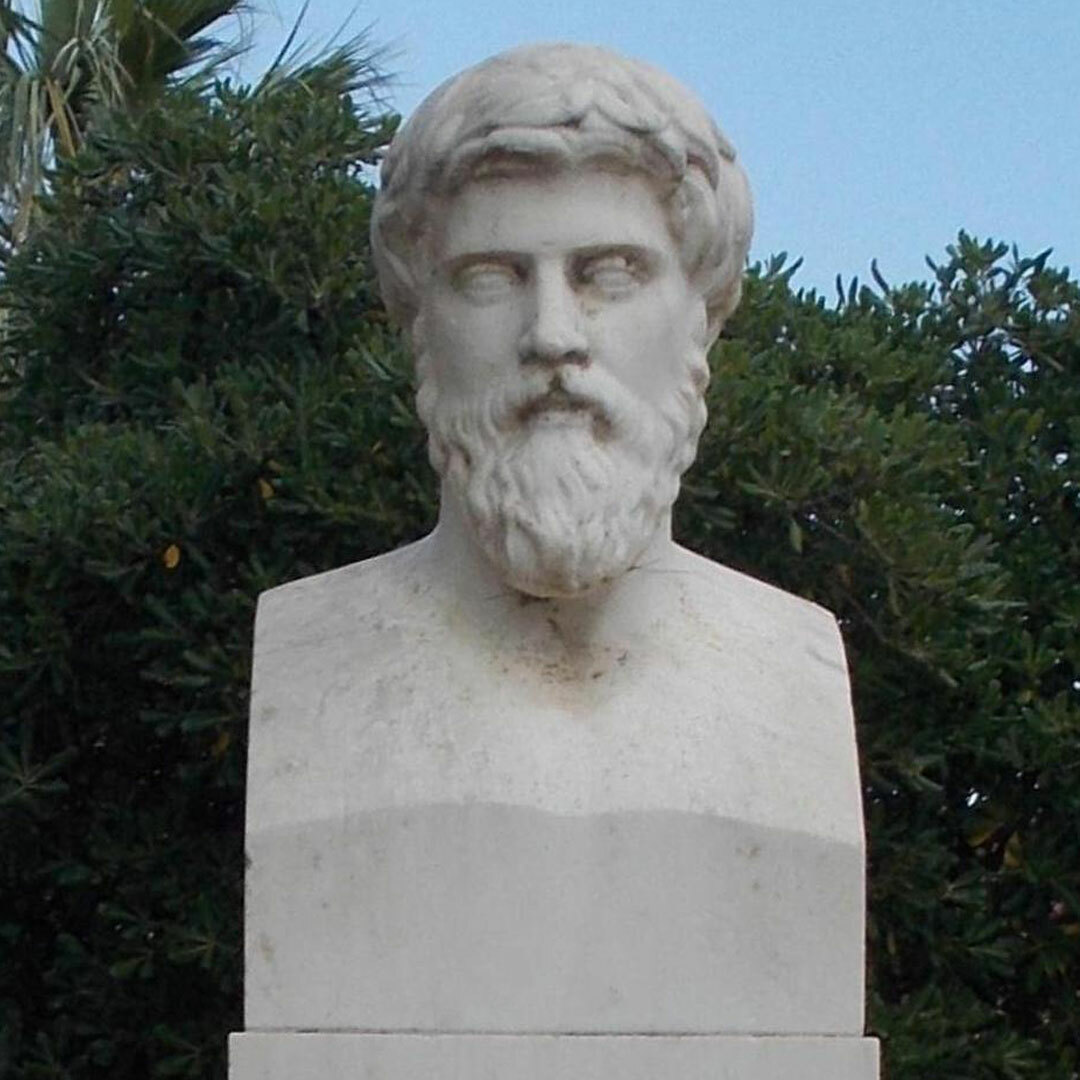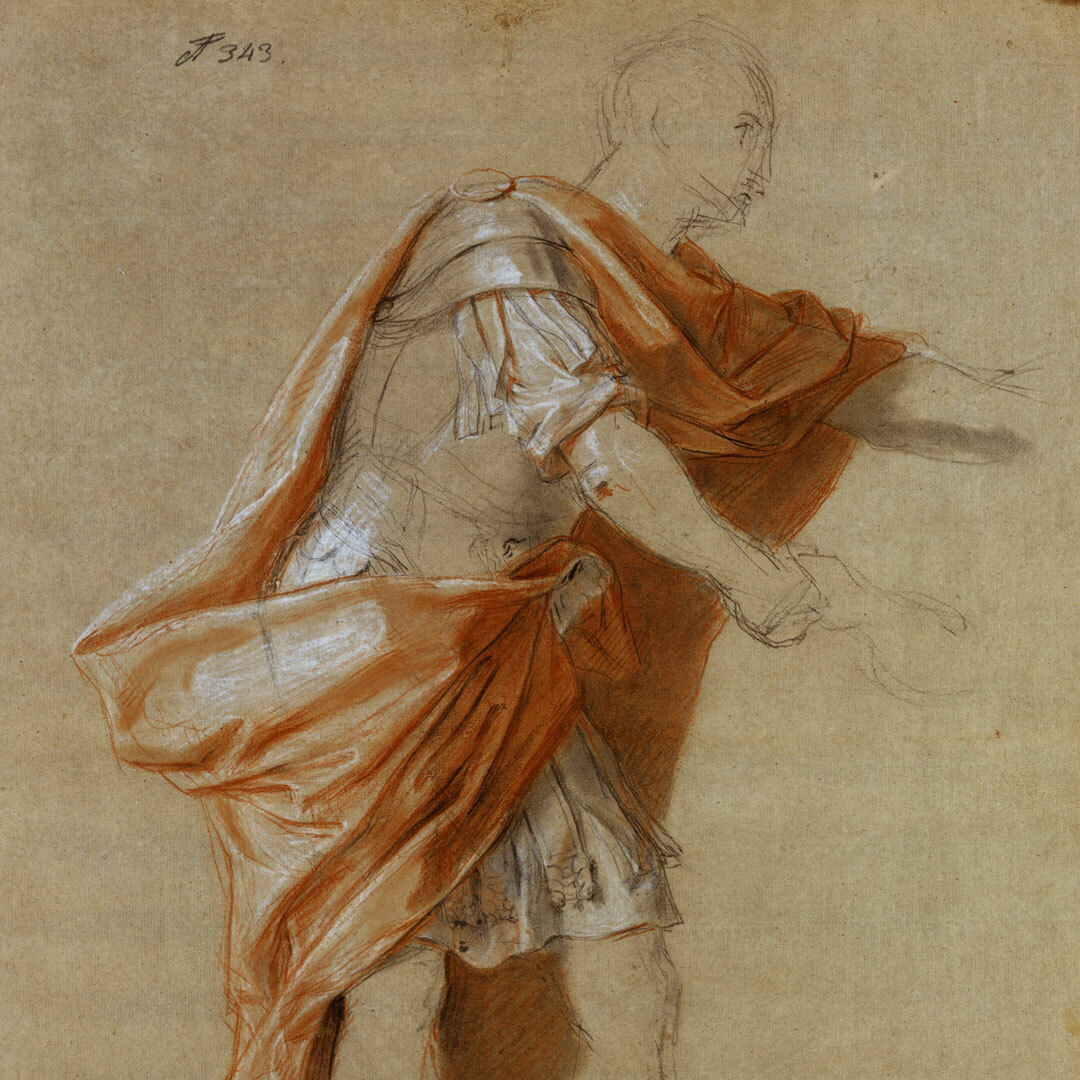Coriolanus
- By William Shakespeare
- In a modern verse translation by Sean San José
- Adapted and directed by Rosa Joshi
JUMP TO: Dates, Run Time, Playbill, & More
Famine threatens Rome and hunger fuels the tensions between the country’s elite and the deprived masses. As civil unrest stirs political upheaval, the war hero Coriolanus is driven to defend and then destroy his own country. Shakespeare’s rare and unique tragedy will be fueled by a dynamic female and non-binary ensemble, and a muscular, movement-focused staging. This modern translation updates the Bard’s language while lifting the story’s core — and reminds us that democracy is fragile and always worth defending.
“Coriolanus is a truly great work of theatrical art, one that T.S. Eliot thought better than Hamlet … a masterpiece.” –The Wall Street Journal
A Synopsis of Coriolanus
Beware — there be spoilers ahead!
Coriolanus begins with the starving plebeians of Rome protesting against the city’s wealthy citizens and aristocracy. As their demonstrations reach a fever pitch, a patrician named Menenius and the famed soldier Martius quiet the uprising by delivering news that they have been granted new political power in Rome in the form of tribunes from their ranks joining the senate.
Martius returns to battle when news that nearby enemies have invaded the Roman territory of Corioles. He almost single handedly defeats the Volscian army when his soldiers retreat out of fear. With this victory, he earns the name Coriolanus and a pledge of revenge by the Volscian leader Aufidius who has long been his rival.
When the newly donned Coriolanus returns to Rome victorious, he is persuaded to campaign for the office of consul — an exercise which requires him to ask for votes from the plebeians who he despises. His disdain enrages the common people and the new tribunes scheme against him. He is charged with treason and banished from Rome. Betrayed, he seeks both refuge and revenge with his enemy Aufidius in the Volsce’s camp.
Coriolanus and Aufidius are nearly victorious in their siege of Rome when Coriolanus’ mother, Volumnia, along with his wife and son plead for his mercy. In an uncharacteristic turn, he gives in to his family’s pleas even though he knows it will surely mean his demise. Coriolanus returns to Corioles where Aufidius and his men plot and execute his assassination. Volumnia returns to Rome, where she is praised for saving the city.
For more detailed synopses and analysis, please visit the following:
More About This Production
Shakespeare’s Collaborators: Sean San Jose & Rosa Joshi
Meet the theater artists whose collaborative creativity in adapting Shakespeare's words brought this unique production of Coriolanus to life.
The World of the Play: Coriolanus' Rome
Situated on the Tiber River in central Italy, Rome grew from a city to an empire over the course of centuries. Sort out myth from fact with this primer on the historical setting of Shakespeare's Coriolanus.
Shakespeare's England
With booming trade, increasing incomes, and a swelling population facing plagues and uncertain food supplies, England during the time of Shakespeare was an era of both prosperity and mortality.
Production History & Trivia for Coriolanus
Written between 1605-1608, Coriolanus is based on Plutarch's account of a Roman general and may have been inspired by a period of civil unrest in Shakespeare's era. In more recent times, actors from Morgan Freeman to Ian McKellen to Tom Hiddleston have played the title role in notable productions.
Coriolanus Reading List
Calling all readers! Multnomah County Library put together a reading list inspired by our production of Coriolanus.
Meet the Cast & Creative Team

The Cast
Lauren is elated to return to the theater and audiences that hold so much of her heart. At PCS: Mary Bennett in Miss Bennet: Christmas at Pemberley, Mrs. Jennings in BEDLAM's Sense & Sensibility, Rose Riordan's Our Town, and Mrs. Cratchitt and others in The Second City's Twist Your Dickens. REGIONAL: Four Seasons at The Oregon Shakespeare Festival (Titania in A Midsummer Night's Dream, Widow in All's Well That Ends Well, Cheshire Cat in Alice in Wonderland, Anne in Sense & Sensibility, Glendower/Judge Silence in HENRY IV: I & II, and others). Fingersmith at American Repertory Theater, The Skin of Our Teeth Artist's Repertory Theater, and others. She's also appeared with The Oregon Symphony, Backfence PDX, and Las Culturistas: I Don't Think So Honey (Live). She would like to thank her husband, Pete, their loving families, Rosa/Cast/Crew, and especially Maureen, Caitlin, Jenna @ PT Solutions, Dr. Kiné Fischler, and Dr. Nora Abass for stitching it all back together again. lauren-modica.com/@lolomodica.
After graduating from The Juilliard School, Mari began her professional career in The New York Shakespeare Festival production of Twelfth Night at The Delcorte in Central Park with Michelle Pfeiffer, Gregory Hines and Jeff Goldblum. In her Broadway debut, she originated the role of Elisabeth in John Guare’s Six Degrees of Separation with Stockard Channing. Subsequent Broadway appearances include Sarah Brown in Guys and Dolls with Nathan Lane and Peter Gallagher as well as Moira in Brian Friel’s Translations with Brian Dennehy and Rufus Sewell. Mari has been awarded five Gordo Awards for Best Actress 2005- 2012, nominated Best Lead Performance (BWW Best of 2014, 2019 and H&H Best of 2023), and was also awarded The Seattle Theater Writers Best Supporting Actress Award 2016. Gregory Award for Best Actress in a Play 2017, as well as 2019, two Gregory Awards: Best Supporting Performance In a Musical as well as Best Supporting Performance In A Play.
Betsy is thrilled to make her debut at Portland Center Stage. Credits include: Henry VI in Bring Down the House (Oregon Shakespeare Festival/upstart crow collective), Lewis in King John (Actor’s Theatre of Louisville/Oregon Shakespeare Festival/upstart crow collective), Elizabeth in Richard III (upstart crow collective), Mrs. Cratchit in A Christmas Carol (ACT Theatre), Mrs. Frank in The Diary of Anne Frank (Indiana Repertory Theatre), The Princess of France in Love’s Labour’s Lost (Seattle Shakespeare Company), Anne Stanton in All the King’s Men (Intiman Theatre), Maddie in The Hundred Dresses (Seattle Children’s Theatre), and Helene in Festen (New Century Theatre Company). Betsy received her B.F.A. from the University of New Mexico and her M.F.A. from Southern Methodist University. Betsy is a co-founding artistic producer for upstart crow collective.
Dré is thrilled to be making her PCS debut! She earned her M.F.A. in acting at Northern Illinois University and has studied at the Moscow Art Theatre and the William Esper Acting Studio. Dré’s local theatre credits include: American Fast (ART), In the Name of Forgotten Women (Grito Productions/CoHo) Dark Sky Full of Stars (Theatre Vertigo), Men on Boats (Third Rail), The Happiest Song Plays Last (Profile Theatre), and many more. On-camera credits include Grimm, Medium, And Metal Lords on Netflix. She is board president of the Entrepreneurs’ Organization and Oregon Children’s Theatre and serves on the board of Oregon Arts Watch. She is co-founder and CEO of local company Farm to Fit, which just celebrated its 12th anniversary! Her most important credit, however, is mom to her 9-year-old daughter Pierce.
With a background of playing 40+ across the stages of American Shakespeare Center, California Shakespeare Theater, Great Lakes Theater, and the Shakespeare Festivals in Oregon, Idaho, and Lake Tahoe, Jessika is excited for her debut at Portland Center Stage. Celebrated for her nuanced interpretations of traditionally male roles such as Othello, Othello; the Bastard, King John; Benedick, Much Ado About Nothing, and Jaques As You Like It, Equally compelling are her portrayals of complex female characters like Rosalind, As You Like It; Goneril, King Lear; Gertrude, Hamlet; Katherine, Taming of the Shrew and Viola, Twelfth Night. Jessika's dedication to the interpreting and delivering of Shakespeare's works can only made possible by you the audience. She thanks You for this opportunity.
Kate is a founding member of upstart crow collective and most recently was seen as King John in King John in ucc’s co-production at Actors Theatre of Louisville. She played King John in King John and Warwick in Bring Down the House (her co-adaptation of Shakespeare’s Henry IV plays) in ucc’s co-productions with the Oregon Shakespeare Festival. Previously with upstart crow collective: Richard III, Bring Down the House, King John (2006) and Titus Andronicus. Regional Theatre: American Repertory Theatre, Seattle Repertory Theatre, A Contemporary Theatre, Intiman Theatre, Tacoma Actors Guild, Seattle Shakespeare Company, The Empty Space. Other Theatre: New Century Theatre, Seattle Beckett Festival, Capitol Hill Arts Center, Lee Center for the Arts, Island Stage Left, Freehold Studio Theatre Lab. Training: American Repertory Theatre Institute at Harvard/The Moscow Art Theatre School.
Queen Anne and Ensemble, in The Three Musketeers; Imogen and Ensemble in The Cymbeline Project; Amelia, others in Mother Road; Luciana, La Comedia of Errors. (Oregon Shakespeare Festival). Queen Anne and Ensemble in Three Musketeers, and Lady Montague in Romeo and Juliet (The Acting Company); Rina in House of Sueños (Seattle Shakespeare Company); Ginny in Elliot, A Soldier’s Fugue (Center Theatre Group); Emma in Fefu and Her Friends (Circle X Theatre Company, JUST Toys); Carmen in La Mer (LA Phil); Yazmin Ortiz in Water by the Spoonful (TheatreSquared); Paloma in Paloma (Los Angeles Theatre Center, New Dramatists); Claudia in Placas: The Most Dangerous Tattoo (national tour); Sandra in Anatomy of Gazellas (Playwrights’ Arena); Benvolia/Lady Capulet in Romeo and Juliet (Shakespeare Center of Los Angeles); Alma in Scar Tissue (Company of Angels). Film/TV: The Morning Show, I Hate Everything, Bruising for Besos, Over the Moon, Kiss Me, Crime School, Fish Bones, The Day the Music Died, The Wallet, Dr. Reasons (web). Training: M.F.A. in acting, USC.
Cy is filled with gratitude to be here! Originally a native of D.C. who now calls Seattle home, Cy has treaded the boards, choreographed, and directed at The Kennedy Center, Arena Stage, The Smithsonian Udvar-Hazy, The Arad Fort in Bahrain, NYC WorkShop Theatre, The 5th Avenue, Seattle Rep, Flint Rep (Wilde Award, Outstanding Choreography, Ragtime), Milwaukee Rep, Village Theatre, NYMF, NYC Fringe, Carnival Cruise lines, as well as appearances on BET, VH1, MTV, SXSW, commercials, and music videos. Her claim to fame was that she toured as a go-go dancer for Steven Van Zandt’s record label, The Underground Garage. Proud member of SDC and AEA. Cy thanks the entire company and all those who make live arts possible! @cypaolantonio cypaolantonio.com
The Creative Team
William Shakespeare was an English playwright, poet, and actor. He is regarded as the greatest writer in the English language and the world's pre-eminent dramatist. He is often called England's national poet and the "Bard of Avon" (or simply "the Bard"). His extant works, including collaborations, consist of some 39 plays, 154 sonnets, three long narrative poems, and a few other verses, some of uncertain authorship. His plays have been translated into every major living language and are performed more often than those of any other playwright. He remains arguably the most influential writer in the English language, and his works continue to be studied and reinterpreted.
Sean is in the first years as Lead Director of the Magic Theatre in San Francisco, filled with Residents, all rightfully centering People of Color. The new team has premiered works from Tongo Eisen-Martin, Roger Guenveur Smith, Bennett Fisher, Luis Alfaro, Playwright-In-Residence Star Finch, Marc Anthony Thompson (Chocolate Genius, Inc.), with new works coming from Ashley Smiley, Virginia Grise w/members of Quetzal, Naomi Iizuka, Richard Montoya, and even more. San José is a co-founder of Campo Santo, a new performances company in San Francisco since 1996. Sean is part of Edith Productions, led by Colman Domingo in film/television/stage. He was a Program Director for Intersection for the Arts, and co-created Alma Delfina Group-Teatro Contra el SIDA-“Pieces of the Quilt,” a collection of 50+ short plays confronting the human face of AIDS. Sean is humbled and happy to be reconnected with Marissa Wolf, and grateful to Lue Douthit.
Rosa is thrilled to be directing for the first time at Portland Center Stage and to be collaborating with Play On Shakespeare and Sean San José. Rosa is the Associate Artistic Director of Oregon Shakespeare Festival and co-artistic producer of upstart crow collective. For upstart crow she has directed King John (with OSF and Actors Theatre of Louisville); Bring Down the House (with OSF and Seattle Shakespeare Company); Richard III (with SSC); and Titus Andronicus. Other directing credits include: As You Like It, Henry V (OSF); Henry IV Part I (Folger Theatre); Macbeth (Merrimack Repertory Theatre); Wolf Play (ACT Contemporary Theater); Mala (American Players Theatre); John Baxter is a Switch Hitter (Intiman Theatre).
Alice is a transnational immigrant choreographer, curator, and hybrid performance artist who creates site-responsive performance rituals and live art installations that examine how history and politics enter the body and condition how we move and relate. Gosti also works under the name MALACARNE. Born and raised by dynamic artist duo SANDFORD&GOSTI in Perugia, Italy, she’s worked between Italy and occupied Duwamish and Coast Salish land (Seattle) since 2008. Drawing on current and historical social realities, her projects center people made invisible by white-normative power structures, including immigrants, womxn, trans-activists, Indigenous populations, and those experiencing homelessness. This is her first season at Portland Center Stage. Other theaters: Oregon Shakespeare Festival, Actors Theatre of Louisville, Seattle Repertory Theater, Folger Theatre, Jacob’s Pillow, ACT Theatre, On the Boards, Intiman Theatre, Velocity Dance Center, Seattle Shakespeare Company, Risk|Reward Festival, ODC Theatre, American Dance Festival and Joyce Theatre. gostia.com malacarne.co IG: @gostiaa @malacarneco
Off-Broadway: Golden Shield (Manhattan Theatre Club), Somebody's Daughter (Second Stage Uptown), Fruiting Bodies (Ma-Yi). Regional: World premieres of Lucas Hnath’s A Doll’s House Part 2 and Lauren Yee’s Cambodian Rock Band (South Coast Repertory). Other regional credits include Center Theatre Group, Boston Lyric Opera, Guthrie Theater, Portland Center Stage, Alley Theatre, Denver Center, Geffen Playhouse, Asolo Repertory, Folger Theatre, Pasadena Playhouse, Dallas Theatre Center, Seattle Repertory, Actors Theatre of Louisville, and others. Set design faculty at UCLA School of Theater, Film and Television. Member of USA 829. M.F.A., Yale School of Drama; A.B. Princeton University. sararyungclement.com
Sarah is delighted to return to Portland Center Stage. Previous PCS credits include Ms. Holmes and Ms. Watson - Apt. 2B, Crossing Mnisose, Bedlam’s Sense and Sensibility, Major Barbara, and A Christmas Memory/Winter Song. Sarah has designed lighting for productions at Oregon Shakespeare Festival, Playmakers Rep, The Repertory Theatre of St. Louis, Guthrie Theater, Asolo Repertory Theatre, KCRep, City Theatre Company, Writers Theatre, Steppenwolf Theatre, Lookingglass Theatre Company, Victory Gardens Theater, and many small rooms across Chicago. She has taught lighting design at Northwestern University, Columbia College Chicago, and Willamette University. She holds an M.F.A from Northwestern. Sarah lives in Portland.
Recent: Hurricane Diane (People's Light), Merry Me (New York Theatre Workshop, co-design Kate Marvin), Belfast Girls (Irish Repertory Theatre), Fences (Shakespeare & Company), The Overview Effect (Contemporary American Theater Festival), Little Women (Theatreworks, UCCS), What the Constitution Means to Me (WAM Theatre, Berkshire Theatre Group), Three Sisters (Two River Theater, co-design Kate Marvin), That Must Be the Entrance to Heaven (Urbanite Theatre). Upcoming: Yellow Face (Roundabout Theatre Company, co-design Kate Marvin). More at carolineengdesign.com
Elisa is a voice, text, and dialect coach, actor, and teacher based in Amherst, MA. Recent coaching credits include Real Women Have Curves the Musical (American Repertory Theatre); Mala (American Players Theatre); Twelfth Night (St. Louis Shakespeare Festival); Cadillac Crew (WAM Theatre), On Your Feet! (The Phoenix Theatre Company); School Girls; or, the African Mean Girls Play (Hangar Theatre Company). Teaching: Assistant Professor of Voice and Acting, UMass Amherst. Previously, Millikin University B.F.A. programs. Affiliations: Voice and Speech Trainers Association; Certified Teacher, Knight-Thompson Speechwork; Certified Associate Teacher, Fitzmaurice Voicework; Actors’ Equity Association. Education: M.F.A. in theatre performance, Arizona State University. B.F.A. in acting, Emerson College. elisagonzales.com
Jeb is thrilled to be working at PCS with such amazing artists! Jeb is a Fight Director, Intimacy Director, Movement Director, Actor and Professor. He is currently the Director of Movement at American Players Theater in Wisconsin. Other credits include: Indiana Rep., Utah Shakespeare Festival, Lake Tahoe Shakespeare, Idaho Shakespeare, Great Lakes Theatre, Capital Stage, Sacramento Theatre Company, and Chicago Shakespeare Theatre, among others. He attended Ball State University, earned an M.F.A. from Illinois State University, and trained with Shakespeare’s Globe Theatre and The Royal Shakespeare Company. Beginning next fall, he will be an Asst. Professor of Movement at University of Tennessee, and a Company member at the Clarence Brown Theater, he has also been on Faculty at Boston University and Western Oregon University.
Katherine is the founding Artistic Director of From the Ground UP: A Research and Development Center for New Art. In the past six years, Katherine has spearheaded a refocusing of the organization’s mission towards serving female and female-identifying population launching an Artist Residency Program, an all-femme program that produces upwards of ten new works in an annual Festival. Katherine collaborates locally and internationally, including her residence with Company of Wolves in Glasgow, Scotland. Most recently, she produced and directed the world premiere, You Can’t Be Serious, in partnership with BodyVox. Currently leading From the Ground UP into its next phase of evolution, Katherine is bringing forth a new phase of programs, reimagining who, what, and how we create new art.
Kamilah is a playwright and dramaturg originally from North Carolina. She currently holds the position of literary manager at Portland Center Stage in Portland, OR. Kamilah has spent several years working in celebrated regional theaters across the country, including Triad Stage in Greensboro, NC, Asolo Repertory Theater in Sarasota, FL and Two River Theater in Red Bank, NJ.
A graduate of Western Oregon University with a B.F.A in technical production, Amanda is a freelance stage manager in the Portland theater scene. She works as a production and stage manager for the likes of Oregon Children’s Theatre, CoHo Productions, and Artists Repertory Theatre. This is her third season on the stage management team at Portland Center Stage, and is grateful to continue to work on impactful stories. Along with stage managing, she is an intimacy coordinator in the Portland area, having worked on various pieces, including several productions at PCS and at Bag & Baggage. She wants to thank her partner for putting up with her late hours and constant busyness.
Jordan's favorite regional credits include: two years of A Christmas Carol and Letters from Home (MRT), Rent (Oregon Shakespeare Festival), Hysterical!, Athena, and The Suburbs (Thrown Stone Theatre Company) and It’s A Wonderful Life: A Live Radio Play (Pasadena Playhouse). She was also the Production Coordinator for Oregon Shakespeare Festival’s digital production of The Cymbeline Project on Episodes 5 through 10. She has done various work at theaters such as NewYorkRep, Boston Court Pasadena, Musical Theatre West, the Old Globe, and the John F. Kennedy Center. Proud AEA Member. M.F.A.: CalArts. jordanemoore.com
For This Prodution
Cy Paolantonio (She/Her), Associate Movement Director
Alea Tran, Production Assistant
Jenna Cady (They/Them), Dresser
Will Bailey (He/Him), Wardrobe Swing
Foggy Bell, Claudia LaRue, Nikki Paulson, Stitchers
Jessica Lee Carr Miller, Miranda Nolten, Wig Artisans
Michelle Stoyanoff, Wig and Makeup Artisan Crew
Heather Taylor (She/Her), Costume Maintenance Technician
Melissa Heller, Crafts Artisan
Roy Joshua Antonio, Asta Baker, Zachariah Barbour, Taz Coffey, Graden Downing, Sophina Flores, Zachary Horn, Allison Knight-Blaine, Steph Landtiser, Dug Martell, Kelli McCloskey, Esther McFaden, Myke Rodriguez, Joshua Yoon, Electricians
What People Are Saying
Local Reviews
"You’ll likely forget that you are watching a translation because this production works so deftly to help you enter and engage in the work that is so clearly Shakespeare. You couldn’t ask for a better or more unmissable invitation to engage this classic and current work of theater." —Oregon ArtsWatch
"...an extraordinary production, one that will appeal to Shakespeare nerds and newbies alike." —BroadwayWorld
"[Jessika D. Williams's] performance alone is reason enough to see this production. And there are many more reasons." —ShoutOut
"In this election year, such social commentary is only the cherry on top of the Coriolanus cake, a highlight as PCS approaches the end of its season." —Willamette Week
Audience Raves
Excellent choreography, costumes, and sound!
Thoroughly enjoyed the all-female cast.
Powerful acting, directing, and staging. A special nod of appreciation to the use of sound and lighting.
Beautiful handling of the language and verse, gorgeous staging; the cast is terrific across the show.
I really enjoyed the production and the experience of coming to the theatre. The Armory is such a fun environment. The show was really good, but there is so much more to it. Catching the pre-show artist talks primes a great intermission discussion and a deeper debate on the way home afterward.
Aesthetically, this is probably one of the most stylish productions I've seen at PCS.
Creative interpretation and presentation.
Really enjoyed it. The use of stillness and pulsing movement was powerful. I enjoyed the interpretation as well, making it current and relevant.
Engaging, interesting interpretation of war, military honor, and politics, especially with all women cast; timely with issues of manipulation of the population for political purposes.
The acting was so amazing. The best I’ve seen in a while.
Critic Reviews
“This production explores extremely well how it is not his lack of empathy for the lower classes that makes Coriolanus such a bad politician, but his inability to hide it. Pretence is unnatural to him, and he alienates common people by stating what he thinks: he despises them.” –Cherwell
“Mowing down multitudes with nothing but a naked sword and a whole lot of testosterone ... Coriolanus has little time for cosmic reflection or soul-searching soliloquies.” –The New York Times
“They reveal that unusually for Shakespeare, what’s most powerful in this play is what’s left unsaid, that the posturing and arrogant rhetoric are an expression of emotional wounds only recognized when it’s too late for them to heal.” –the arts desk
“Coriolanus is one of Shakespeare’s most opaque heroes. Unlike Macbeth or King Lear, the main character doesn’t have any major monologues, and one must retain an inward attitude to better understand the character.” –SEEstage
“Whether it be words of wisdom or a thrown-away thought, the adaptation is powered by sharp wit and quick thinking.” –BroadwayWorld
“Coriolanus is a truly great work of theatrical art, one that T.S. Eliot thought better than Hamlet, and the plot, which pits the title character, an unabashedly proud patrician, against the common folk, easily lends itself to updating ... A hero is needed to save the day, and Coriolanus moves decisively to fill the role. What he is unwilling to do is accept the adulation of the multitudes after he succeeds.” –Wall Street Journal
Portland Center Stage is committed to identifying & interrupting instances of racism & all forms of oppression, through the principles of inclusion, diversity, equity, & accessibility (IDEA).











































